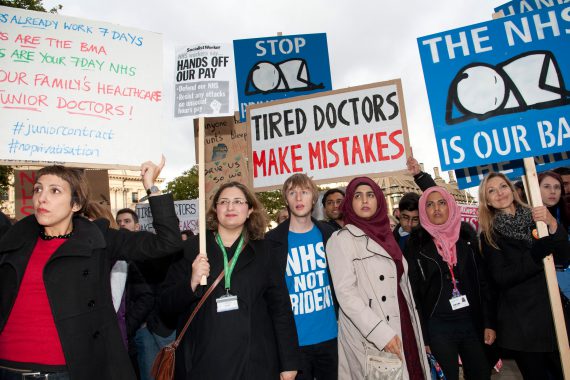Practices ‘unlikely to face fines’ for failing to implement trainees’ rotas

Guardians of safe working are unlikely to have to impose fines on GP practices to protect trainees from overwork, an employers’ organisation has said.
Trainee GPs are rotected from working excessive hours by guardians who have the power to fine their bosses when they are put onto the 2016 contract as of this month.
Guardians for safe working ‘have the power to levy financial penalties where safe working hours are breached,’ according to NHS Employers.
Under the new junior doctor contract – which was imposed by the Department of Health last year after a series of strikes – trainees will all have access to guardians who are senior appointees and have the power to fine for any breaches.
Most areas have recruited guardians but the BMA was helping to try and find people to take on the role in some areas at the time of writing.
NHS Employers said it was unlikely that guardian fines will ever be levied in general practice, but they would be an incentive for practices to stick to safe working hours.
Lead employers can re-charge general practice ‘as obviously better management of the situation could have meant the fine was avoided’.
Its guidelines said: ‘For a fine to be levied, it would have to mean that a doctor works on average more than 48 hours per week, or more than 72 hours in seven days. The nature of GP work schedules would mean this would be improbable, and even if hours did become excessive, time off in lieu should be granted to bring hours down.’
It said it was unlikely GP trainees would have their rest hours cut to just eight hours or miss more than a quarter of their breaks.
But it warned that fines would work in the same way as for doctors in hospitals.
Guardians are appointed by the lead employer, with alternative arrangements for trainees who are employed directly by their practices.
Dr Jeeves Wijesuriya, chair of the BMA’s junior doctors committee said guardians will be able to agree alternatives to fines, such as time off in lieu.
He said: ‘This system tends to be more responsive and reactive.’
He said the BMA has worked with the GMC, Health Education England and NHS Employers to develop the scheme.
‘The key is finding a solution which works in different groups,’ he said.
He added that data collected from exception reports will highlight ‘powerfully’ any gaps or problems if trainees are unable to attend trainee consistently, which could pinpoint a need for more resources.
Every trainee and supervisor have received letters about the new system.
NHS Employers said the guardians are contractually responsible for issuing fines if safe working rules are breached. They are likely to be billed according to local memoranda of understanding (MOU). Practices will not be reimbursed by HEE.
Dr Richard Vautrey, chairman of the BMA’s GP Committee told Pulse: ‘We would hope that it was not required.’
Fines are set at four times the basic or enhanced rate of pay due at the time of the breach.
Employers would have to pay the doctor and guardian, or just the guardian for missed breaks.
Affected doctors will get 1.5 times the locum rate and the rest of the penalty goes to the guardian.
Fines kick in when doctors’ 48 average weekly working limit or maximum of 72 hours worked in a consecutive seven day week are breached, or the minimum 11 hour rest period is cut to eight hours.
They can also be levied when meal breaks are missed more than 25 per cent of the time.
Under the new rules lead employers have to appoint guardian for all their trainees, including GPs.
Practices have to work together with lead employers and identity an appropriate guardian if there are no lead employer arrangements.
The cost of guardian fines cannot be clawed back from HEE and guardians are not allowed to use the money for anything in the agreement between the Learning and development Agreement and HEE. Fines can only be used ‘to supplement and improve existing conditions’.
The new contract is expected to be rolled out by the end of October, however GP leaders have stated there is no legal obligation for practices to adopt it.
Pulse October survey
Take our July 2025 survey to potentially win £1.000 worth of tokens











